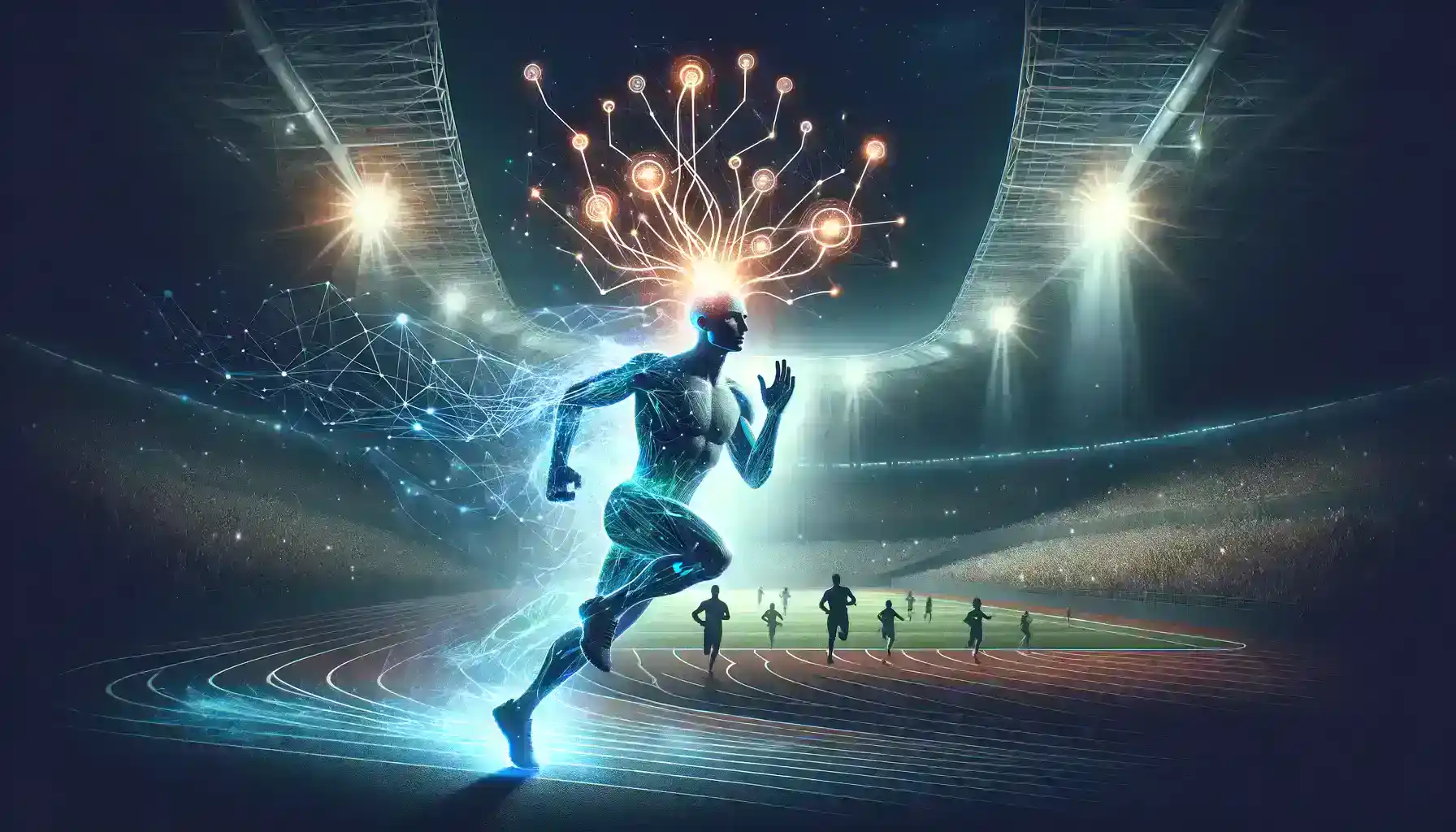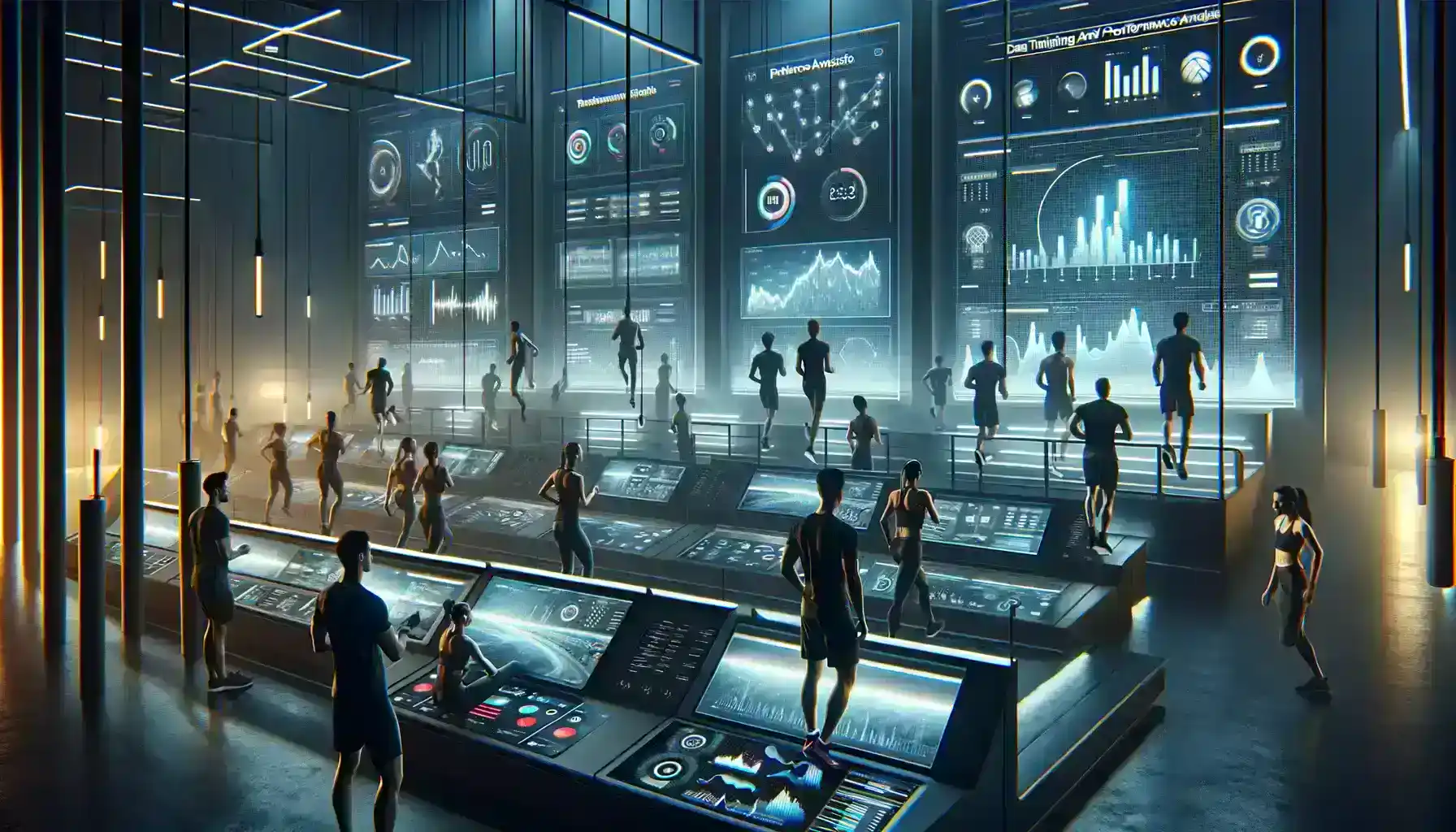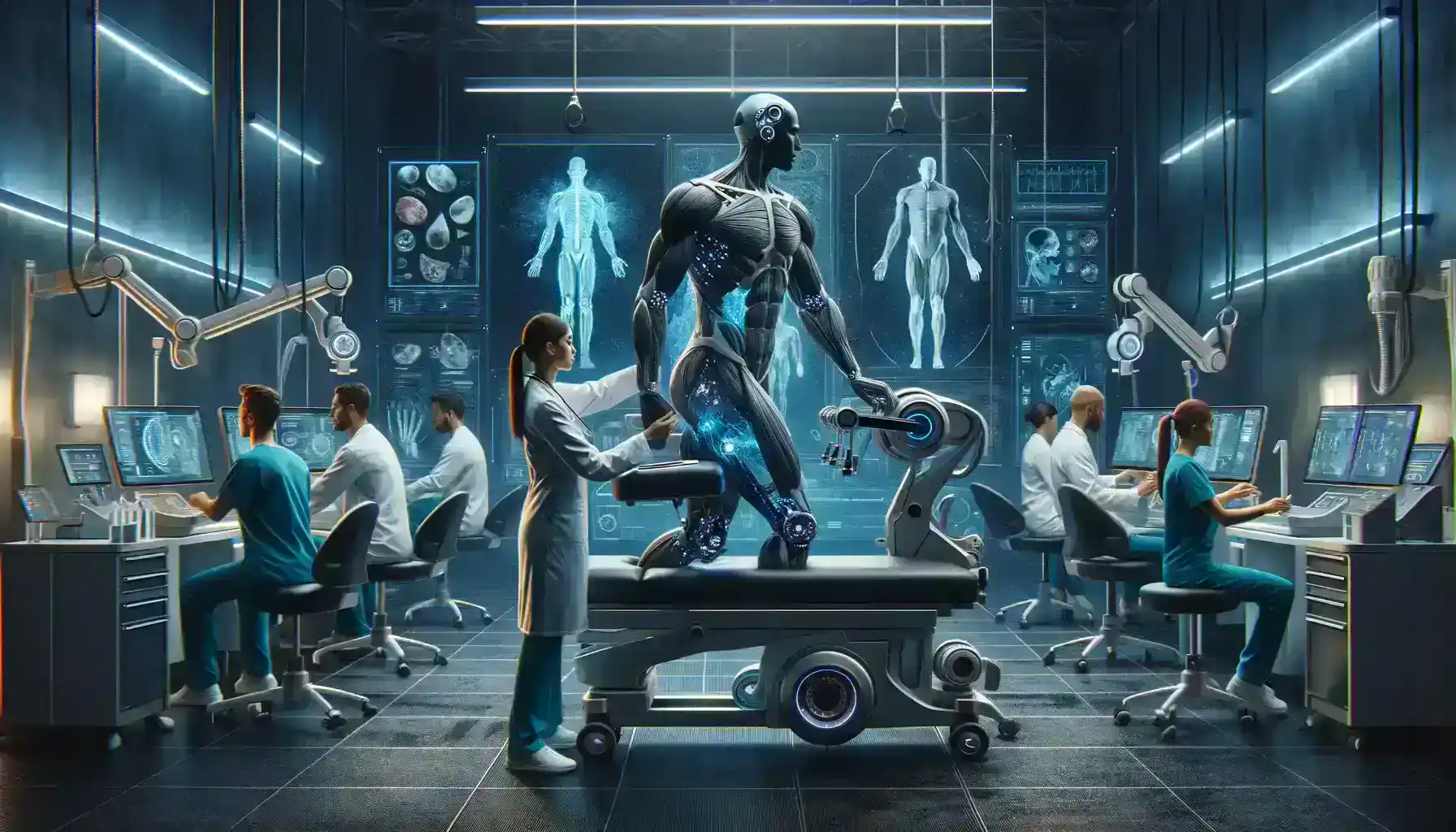Table of Contents
In recent years, the world of sports has witnessed a dramatic transformation, thanks to the integration of Artificial Intelligence (AI) technology. AI in sports has become a game-changer, revolutionizing the way athletes train, compete, and even how fans experience their favorite sports.
Meet Sarah, a professional basketball coach who relies on AI-powered analytics to fine-tune her team’s strategies. Join John, an elite marathon runner, as he uses AI-powered wearables to optimize his training regimen. And don’t forget Emily, a die-hard sports fan who engages with her favorite teams through AI-driven chatbots and virtual assistants.

In this article, we’ll explore the major points and examples of how AI technology in sports is supercharging performance and transforming the game in various sports. From data-driven training and injury prevention to personalized nutrition and immersive simulations, AI is changing the game across the sports world.
As we delve into these examples, you’ll see how AI in sports is impacting athletes like Sarah, John, Emily, and countless others, as well as coaches and fans who are benefiting from AI’s remarkable impact on sports. The future of sports is here, and AI in sports is leading the charge.
Data-Driven Training and Performance Analysis: AI in Sports Supercharging Athletes
AI’s impact on sports analytics goes beyond basketball. Major sports leagues like the NFL, MLB, and Premier League are also leveraging AI in sports to gain a competitive edge. In American football, AI systems analyze player positioning and movement data, aiding coaches in devising intricate plays and defensive strategies. Baseball teams use AI in sports to evaluate player statistics, helping them make informed decisions during drafts and trades.

Moreover, AI-powered computer vision technologies in sports, like the Hawkeye system in tennis, and trackball trajectories with pinpoint accuracy. This ensures precise line calls, eliminating controversies and enhancing the fairness of the game.
In addition to aiding professionals, AI in sports has democratized sports analytics for amateurs and enthusiasts. Mobile apps and wearable devices provide aspiring athletes with access to performance data, enabling them to fine-tune their skills and reach their full potential. AI-driven coaching apps in sports, like HomeCourt for basketball, offer instant feedback and skill improvement suggestions, making high-quality training accessible to all.
The synergy between AI and sports continues to evolve, promising a future where athletes, coaches, and fans alike can enjoy a more data-driven, immersive, and engaging sports experience with the help of AI in sports.
Injury Prevention and Rehabilitation

The application of AI in sports injury prevention extends its reach across various sports. In addition to Catapult Sports and STATSports, companies in AI sports technology offer wearable technology that tracks player movements, helping sports teams manage player loads and reduce the risk of overuse injuries. For instance, soccer teams monitor players’ distances covered, sprinting patterns, and fatigue levels using AI in sports to optimize training and minimize injuries.
AI-driven physical therapy and rehabilitation programs in sports have also made significant strides. Virtual reality (VR) therapy, powered by AI in sports, provides athletes with interactive exercises that aid in recovery while minimizing the risk of re-injury. Wearable rehabilitation devices, such as those from KineticMD, offer real-time feedback and guidance, ensuring that athletes perform their exercises correctly and safely.
This AI-driven approach to injury prevention and rehabilitation in sports not only benefits professional athletes but also extends to amateur and recreational sports enthusiasts, allowing them to enjoy their chosen activities with reduced injury risk and improved long-term well-being. As AI in sports continues to advance, the future of sports promises to be safer, more resilient, and filled with athletes who can perform at their peak for years to come, thanks to AI in sports
Precision Nutrition and Recovery
The intersection of AI in sports and nutrition has revolutionized the way athletes fuel their bodies. Beyond personalized meal planning, AI-driven apps and devices in sports, such as Nutrigenomix and MyFitnessPal, offer athletes real-time dietary insights. They track macronutrient intake, vitamins, and minerals, ensuring optimal nutrition for peak performance in sports.
AI’s role extends into optimizing recovery in sports, where it evaluates various factors influencing an athlete’s well-being. Sleep tracking devices in sports, like WHOOP and Fitbit, use AI algorithms to analyze sleep patterns and provide recommendations for restorative sleep. Monitoring fatigue levels through wearable technology in sports helps athletes and coaches make data-driven decisions about training intensity and recovery periods, reducing the risk of burnout and overtraining.
By leveraging AI in sports nutrition and recovery strategies, athletes can fine-tune their diets, rest patterns, and training regimens, ultimately unlocking their full potential and extending their careers in the world of sports with the help of AI in sports.
Additionally, developing a diet planner app that integrates AI can provide personalized nutrition plans, track dietary intake, and offer real-time adjustments to optimize performance and health.
Performance Enhancement through Simulation
The impact of AI-driven simulations on sports training is profound and multifaceted. In motorsports, Formula 1 teams employ AI simulations not only for race scenarios but also for vehicle development. These simulations allow engineers to virtually test aerodynamics, suspension setups, and tire choices, leading to faster car improvements and more competitive racing.
Soccer teams benefit from AI-powered simulators like Rezzil by providing players with a dynamic and immersive training experience. These simulations recreate match situations, helping players enhance their decision-making, ball control, and tactical awareness. Moreover, AI algorithms analyze player performance within the virtual environment, offering personalized feedback and areas for improvement.
Beyond Formula 1 and soccer, AI simulations are also making strides in sports like golf, tennis, and even team-based eSports. These simulations create a safe and controlled environment for athletes to practice, adapt to different scenarios, and refine their skills, ultimately leading to improved performance on the field, track, or virtual arena.
Fan Engagement and Experience
The fusion of AI and fan engagement has redefined the sports-watching experience. Beyond chatbots, virtual assistants, and AI-driven apps, AI algorithms analyze vast datasets to offer fans deeper insights. For instance, AI systems can predict player performance, and game outcomes, and even suggest optimal fantasy sports lineups.

Moreover, AI-driven camera systems, such as Intel’s True View technology, create immersive, 360-degree viewing experiences. These systems capture every angle of the action, allowing fans to control their perspective during replays. Additionally, AI-enhanced graphics overlay real-time statistics and information onto broadcasts, enhancing viewers’ understanding of the game.
In the realm of eSports, AI-powered commentary bots provide real-time analysis and play-by-play coverage, enriching the viewer’s understanding of complex gaming strategies.
Through AI, sports fans worldwide can enjoy a more interactive, informative, and visually captivating experience, bringing them closer to the heart of the game they love.
eSports and AI Competitions
Esports, at the forefront of technological innovation, showcases AI’s pivotal role in shaping the gaming landscape. AI-driven game development enables dynamic and adaptive gameplay, where in-game opponents and challenges adjust to a player’s skill level, ensuring a challenging experience for both novice and expert gamers. This adaptability enhances player engagement and enjoyment.
Competitive analysis in esports relies heavily on AI algorithms that dissect player strategies and gameplay patterns. Organizations use these insights to scout and recruit top talent, forming elite teams. AI-powered analytics also assist in devising winning strategies by analyzing vast datasets, identifying emerging trends, and fine-tuning gameplay tactics for optimal performance.
As the esports industry continues its meteoric rise, AI’s influence will only deepen, ensuring that players, teams, and audiences alike remain at the cutting edge of competitive gaming.
Examples of AI in Sports
Hawk-Eye Technology in Tennis and Cricket: Hawk-Eye employs computer vision to track the trajectory of the ball in real-time, assisting officials in making accurate decisions on line calls and LBW (leg before wicket) decisions in cricket.
Statcast in Baseball: MLB’s Statcast system uses radar and cameras to capture player movements and ball-tracking data. This data helps fans and teams analyze player performance in unprecedented detail.
Virtual Reality (VR) Training in Football: NFL teams are using VR technology to simulate game scenarios, allowing quarterbacks to practice their decision-making and receivers to work on their route running in a safe and controlled environment.
Video Analysis in Soccer: AI-powered video analysis tools like Hudl and Wyscout enable soccer teams to break down match footage and scout opponents more efficiently. Coaches can use these platforms to analyze player movements, tactics, and set-piece strategies, gaining a competitive edge.
Performance-Enhancing Wearables in Athletics: Athletes in various disciplines, from track and field to cycling, use AI-powered wearables like the Whoop strap to monitor their heart rate, sleep patterns, and recovery. This data helps them optimize their training and improve overall performance.
AI-Refereeing Assistance in Basketball: In basketball, AI technology is being used to assist referees in making difficult calls, such as determining whether a shot was taken before the shot clock expired or if a player’s foot was on the three-point line. This helps reduce human errors and ensures fair play.
Tennis Stroke Analysis: Tennis players can benefit from AI-based stroke analysis tools like SwingVision. These systems use computer vision to track the trajectory and spin of the ball, helping players and coaches analyze and improve their strokes.
AI-Powered Training Equipment: Companies like Tonal have developed AI-driven home gym systems that provide personalized workout programs and real-time feedback. These systems adjust resistance and guide users through exercises to maximize their fitness gains.
eSports Analytics: In the world of eSports, AI is used to analyze gameplay and identify patterns and strategies employed by professional gamers. This data helps eSports teams refine their strategies and improve their performance in tournaments.
AI-Generated Virtual Coaches: AI-powered virtual coaches like “Coach AI” by Beyond Sports provide personalized feedback to athletes during training. They can analyze player movements and offer insights on technique and strategy.
AI-Enhanced Sports Medicine: AI technology aids sports medicine professionals in diagnosing and treating injuries more effectively. For example, IBM Watson Health collaborates with healthcare providers to develop AI solutions for injury management and rehabilitation.
AI-Powered Sports Betting: In the realm of sports betting, AI algorithms analyze vast amounts of data to make predictions about game outcomes. This helps bettors make informed decisions and increases the accuracy of odds offered by sportsbooks. The technology extends beyond just predictions – AI-powered tools now help users discover the best deals across platforms, automatically finding and applying promos from Fanatics sportsbook or other betting sites to maximize potential returns while minimizing risk.
Conclusion
AI technology is undeniably revolutionizing sports by supercharging athlete performance and transforming the fan experience. From data-driven training and injury prevention to personalized nutrition and immersive simulations, AI is changing the game across various sports. As technology continues to advance, we can expect even more exciting developments that will push the boundaries of what is possible in the world of sports. The future of sports is here, and AI is leading the charge.